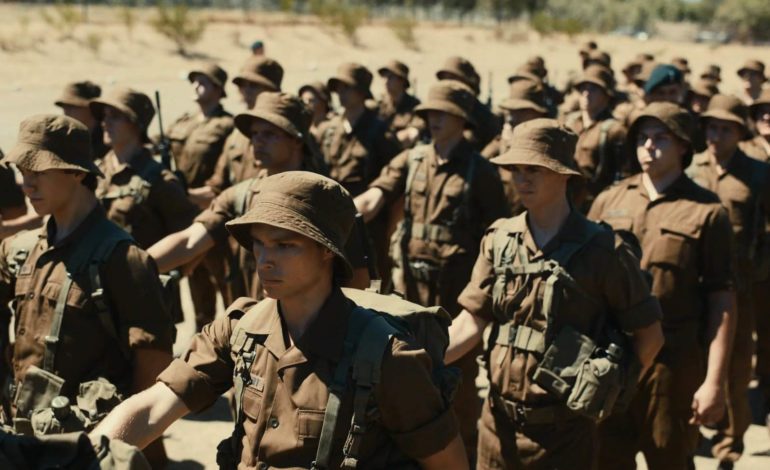

The many wars against communism in the 20th century were not only fought on the ground, the battle was ideological before anything else. Communism was sold (by those who fought against it) as an ideology that somehow signified both weakness yet an existential threat to the liberal order, and therefore had to be crushed in all its forms, its ‘spread’ had to be stopped. South African director Oliver Hermanus uses the setting of the border war between South Africa and Soviet-backed Angola occurring in the 1980s to examine how this ideological battle affected the space between the ears of those who fought for South Africa, centered around young soldier Nicholas van der Swart (Kai Luke Brummer) and his queer sexual awakening within an intensely prejudiced environment. The film’s title, Moffie (2019), is an Afrikaans slur for a gay man, also signifying weakness and femininity, a word that is thrown around dozens of times during the film, a constant berating meant to shape these young men into hyper-masculine, anti-communist, racist, killing machines. Military service was compulsory for South African boys in the 80s, and van der Swart’s family treats it almost as if he were going to camp, a send-off celebration opening the film, complete with friendly jokes and even a gift of a porno magazine, meant “for ammunition”. Immediately after we follow van der Swart onto the train, the score swells, and the descent into madness begins.
The film sits somewhere in-between Stanley Kubrick’s Full Metal Jacket (1987) and Claire Denis’ Beau Travail (1999), spending a significant amount of time in training before we eventually hit the battlefield. Nicholas quickly learns that masculinity is currency in the army, one’s identity must conform with that of the ideal soldier or face dire consequences. Scene after scene of brutal training exercises beat these young men into submission, where even though most of them seem relatively detached from the ideology propelling the conflict, they are all willing to do anything to avoid the wrath of their Sergeant. Hermanus’ camera maintains an intimacy with the characters, using beautiful (mostly) handheld cinematography amongst the South African landscape and army barracks The film is not so much interested in the conflict itself, rather the manufacturing of the conflict in the soldier’s minds. One’s identity, especially if it deviates in any way from the dominant soldier mentality, wages battle with an all consuming ideology, a hatred that is ironed into these young men through propaganda films, constant reprimanding, and in some cases, physical torture.


Amongst the grueling training, the film gestures towards a homoeroticism that arises from these men living in such camaraderie with each other, a shirtless and sweaty volleyball match being the most overt example, along with a collective skinny-dip during a lull in the action. A potential romance arises during a night of training, where van der Swart and his troop are ordered to sleep in a trench overnight in the rain, and an incredibly touching moment occurs between him and a fellow soldier named Stassen (Ryan de Villiers). Under a tarp to protect from the rain, the two soldiers huddle together for warmth as Stassen caresses van der Swart’s cheek, a scene both touching and a little terrifying, because we know the consequences if they were to be caught. These consequences materialize for Stassen, relegated to a ‘reform facility’ within the training camp dispassionately referred to as ‘the loony bin’, as even a hint of homosexuality is treated as a psychological disorder. What the film makes clear however, is that the real psychological damage comes as a result of being a part of the army, this asymmetrical conflict between an almost faceless enemy creating deep scars in the minds of the soldiers. After seeing two soldiers shoot morphine, van der Swart rejects their offer, naively stating how he isn’t in pain, only to be responded to with a laugh and a harrowing declaration: “We’re all in pain”.
This is Hermanus’ fourth feature film, and he shows an admirable maturity whilst navigating a complex network of issues. There is a version of this film that could’ve ended in romance between van der Swart and Stassen, but in an unfortunately realistic turn, it never comes to pass, even after they return from their tour of duty. Coming home doesn’t give way to happiness, only shell-shock, an illustration of deep psychological wounding that took place in the minds of a whole generation of young men. It is a film filled with great performances, especially from lead actor Kai Luke Brummer, whose previously soft features become increasingly hardened as a result of his experiences, innocent eyes giving way to a sullen stare when he finally comes back home to his family. A tiny bit of aesthetic overdetermination can cause a little bit of a headache, the film’s more poetic flourishes feel a bit misplaced, but we never waver too far from the center, a bleak vision of a generation destroyed by the scars of war. Undeniably a difficult watch at points, but a strong emotional core arises amidst the tragedy and makes it a memorable experience.
Verdict: 4.5 out of 5 Stars
